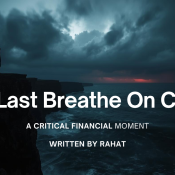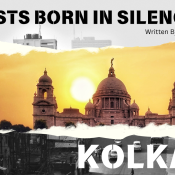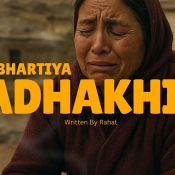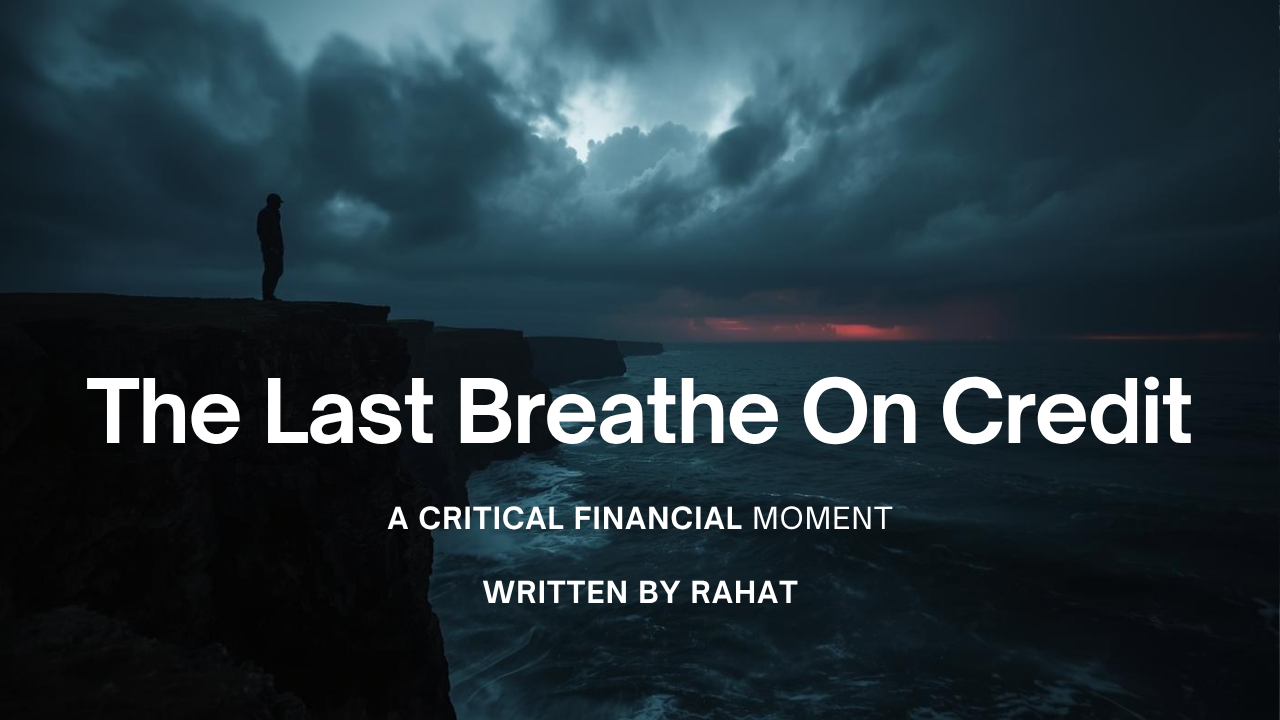
The Last Breath on Credit
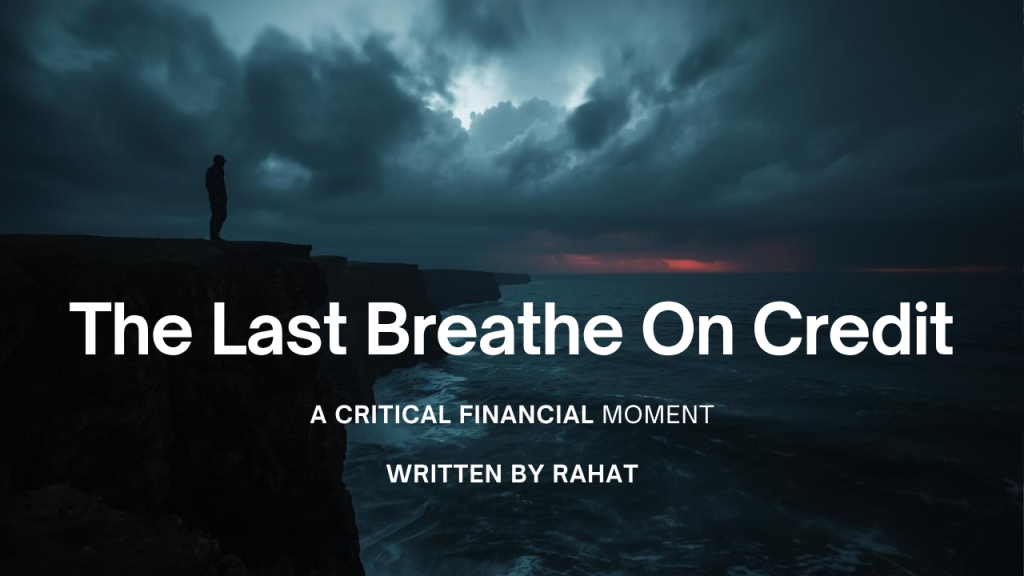
Quote by Rahat Ali:
“Life should not be measured by the currency you carry, but by the humanity we choose to show.” – Rahat Ali
I don’t know how long I will survive today. हर पल लगता है कि मेरी सांस मेरी आखिरी सांस हो सकती है। The ventilator hums beside me like some indifferent god, pumping air into my failing lungs while my mind races faster than my body can respond. I can feel the tubes in my throat, a strange alien presence, but worse than that, I feel the weight of my bills, each second adding another zero to a number I don’t have. The nurse’s face is kind but weary, like she has seen too many people like me — people with no money, only desperation.I remember earlier this morning, when they wheeled me in. I could barely breathe, my chest tight, my heart pounding. “Sir, the total estimate for ICU and ventilator care will be around five lakhs per day,” the billing officer said. I laughed bitterly, though no one heard. पांच लाख? मेरे पास पाँच रुपये भी नहीं थे। If I die here, would my body even be returned to my family without this number cleared? The thought alone makes my throat dry, even as the ventilator pumps air in and out.Across the ward, a woman gasps, struggling against her own tubes. She is younger than me, maybe twenty-eight, but her eyes already hold the kind of sorrow older than my father’s wrinkles. “Mujhe… ghar jaana hai,” she whispers in Hindi, her voice almost swallowed by the machine’s hiss. Her hands twitch helplessly. I know her pain, her fear, the panic when every heartbeat counts against her dwindling savings. I nod slightly, though she can’t see. हम दोनों ही अपने बिलों के कैद में हैं, अपने सांसों के कर्ज़ में।I think about my mother back home. She saved for my treatment, selling jewelry she had kept for decades. The money was enough for maybe two days in this hell. अब वो भी खत्म हो गई। My wife is on the phone, crying silently, her words swallowed by my ventilated silence. She is trying to transfer money, calling distant relatives, begging for help that will never arrive fast enough. The doctor walks past, clipboard in hand, eyes scanning numbers, not faces. “Sir, we need to increase support medication, extra monitoring,” he says. Each word is a dagger — extra medications mean extra thousands, which I don’t have.A nurse adjusts my ventilator. “Sir, your oxygen saturation is dropping.” My chest tightens — more than the tubes, more than the disease, it is the fear, the humiliation, the impossible choice between life and the bill. I try to say something, but the words die in my throat. Even if I speak, they won’t hear my screams over the machinery and the clinical efficiency of profit.Across from me, she’s crying silently, tears pooling in the corners of her eyes. I know she is thinking the same thought as I am: अगर हम मर गए, तो हमारा शव घर कैसे जाएगा? Her ventilator hisses, a cruel, mechanical lullaby. I imagine our families waiting, helpless, hoping, bargaining with banks, friends, strangers, anything, just to claim what is theirs — our bodies, cold and distant, trapped behind the invisible chains of money.I think about the disease, the fever, the pain that brought us here. I remember coughing until I could no longer stand, clutching my chest, hoping that somehow someone would notice, would help, would save me without asking for money I don’t have. But the hospital is a machine, not a home. It doesn’t care about my prayers or my mother’s jewelry or my children’s future. It only cares about the numbers on its ledger.The woman’s ventilator alarms briefly. The nurse rushes. I watch her chest rise and fall mechanically, the human inside caged by wires and plastic. I want to scream, “Stop! This isn’t medicine, this is extortion dressed as care!” But the ventilator pushes air into my lungs, and I am powerless. My mind drifts. If I die, they will not release me. I can almost hear the hospital accountant whispering, “Clear the bill, then claim the body.” My blood runs cold.I think of the moments I took for granted — walking in the park, drinking tea with friends, arguing with my wife about trivial things. सब बेकार लगे अब। The irony stings: all that mattered so little, yet the money that didn’t exist matters more than the breath in my lungs. I remember my childhood, my father’s hands, the smell of monsoon rains, the first time I rode a bicycle. I cling to memories, like drifting paper in a storm, as my oxygen saturation dips again.Her hand twitches. She tries to reach out, and for a second, our eyes meet. Without words, we communicate our shared terror, our invisible chains. I see the same story in her eyes — the unspoken bargaining with life, the fear of debt as a posthumous jail, the realization that medicine has become a luxury, not a right. We are living, yet already prisoners of bills we cannot pay.The ventilator beeps again. My pulse races. I hear my wife’s voice faintly through the speakerphone — “Hold on, beta, please…” The sound is a lifeline and a knife at once. I want to tell her I am scared, that I can’t breathe not just because of illness but because of the impossible cost of surviving. But words fail. मेरी आखिरी दुआ यही है कि कोई सुन पाए, कोई समझ पाए।I recall my friend who promised to help with money, his voice full of regret, “I wish I could…” He could not. Neither could the distant relatives, the bank, the government. Only the hospital thrives on every second of our suffering. Each ventilator beep is profit; each medication drip is ledger entry. The human element is gone. My lungs feel the machine’s rhythm, but my heart beats out of sync with humanity.She is quiet now, eyes half-closed. Perhaps asleep, or perhaps her mind is somewhere far from this cold, unfeeling room. I imagine her family, just like mine, pacing outside, wringing hands, pleading, bargaining. I imagine her mother clutching her rosary, praying, praying… praying that money will arrive before life slips through the ventilator’s mechanical grasp. And yet, the bill ticks higher, faster than prayers, faster than hope.I see a drip fall. I see the nurses’ practiced efficiency. They do not see me, not truly. I am a number. I am debt. I am a commodity measured in lakhs, in thousands, in rupees per second of survival. The irony of life is bitter — the same body that fought to live as a child, that ran, laughed, loved, now tethered to tubes and ventilators, its worth judged in currency.Her eyes flicker open. She whispers, “Mujhe maaf kar do,” as if asking forgiveness for being poor, for needing care, for breathing. I want to reach out, to hold her hand, to tell her it is not our fault. But my arms are restrained by life-saving devices, my voice crushed by fear and ventilator tubes. We are two souls trapped in a system that profits from our vulnerability.I remember a time when hospitals were sanctuaries, when doctors swore to save lives without asking for wealth. अब सब बदल गया। Now, the only oath seems to be the one inked on bills, contracts, and receipts. Life here is conditional — conditional on cash, collateral, connections. I realize I am bargaining with death and money at the same time, and neither will show mercy.The ventilator hisses. My oxygen dips dangerously. My vision blurs. I see flashes of home, my mother, my children. I see her mother, her husband waiting. I see the accountant’s ledger, the nurse’s clipboard, the doctor’s detached efficiency. Everything merges into a single horrifying realization: अगर हम मर गए, तो शव भी पैसों का इंतजार करेगा। If life is denied to the poor, even death comes with a bill.I gasp silently. I think of my children’s eyes, my wife’s tears, my mother’s shattered faith. I think of her hands, trembling, reaching for a life she cannot afford. And then, as if the universe itself acknowledges our suffering, my heart slows, my mind drifts. I feel the ventilator push air one last time, the numbers on the monitor flatline slowly, the machines indifferent.Her eyes close too, a single tear tracing down her cheek. Outside, families wait, phones ring, bank accounts are checked, prayers are murmured — but inside, life is gone. The hospital waits for its due, even as souls leave bodies they can never reclaim without money.And so, in these few minutes of shared struggle, of fear, of unbearable cost, we vanish quietly, leaving behind the bitter lesson of a society that values currency more than life.May someone read this, understand this, and remember that humanity cannot be measured in rupees.
Title: The Last Breath on Credit
SEO Description: A raw and emotional bilingual narrative from the ICU ventilator bed, exposing the helplessness of poor patients in Indian private hospitals as medical bills soar and life slips away. Written by Rahat Ali.
Quote by Rahat Ali:
“Life should not be measured by the currency you carry, but by the humanity we choose to show.” – Rahat Ali
Hashtags:
HospitalDiaries #MedicalDebt #RahatAliWrites #HealthcareCrisis #IndiaStories #VentilatorLife #SocietyReflection #LifeAndDeath #TragicTruth #BilingualStory #LastBreathOnCredit
Published By: The Uncommon Stories Of India

All Categories
Recent Posts
The Last Breath on Credit
Rapists Are Born in Silence: Another Daughter of Kolkata Screams for Justice.
The Bhartiya Ladhakhi:Echoes From The Roof Of The World
07316984833
contactus@tucsi.org

